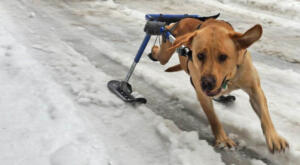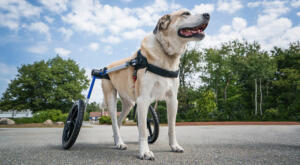The Fox News opinion piece by Sheila Goffe titled “The US has become a dumping ground for foreign ‘puppy mill’ and ‘rescue’ dogs” (June 30) was striking. In it, Goffe uses a lot of fear-based language to promote the idea that our country is being overrun by foreign dogs of questionable health and origin.
Let’s ground statements in facts
It is dangerous to make broad statements that aren’t grounded in facts. This can hurt rescue organizations that work diligently to help dogs.
It is also disingenuous to lump all rescue dogs together with dogs who are bred abroad with the intended purpose of being sold, some of who may indeed be in puppy mill situations.
Let’s be clear and keep those two sources of dog importation separated. Each warrants an appropriate response.
Dogs bred for sale
We should be vigilant to uncover puppy mills, whether in or out of our country. As the October 2017 U.S. Centers for Disease Control and Prevention regulations cite, imported puppies should be at least four months of age and need to be properly vaccinated with subsequent documentation. The unquestionable goal is to humanely raise healthy pups, full stop.
But our love affair with dogs means that importing dogs may be necessary in the U.S. to keep up with the growing demand. This hotly debated topic is discussed in a The Washington Post February 2017 article by Kim Kavin titled “Does America have enough dogs for all the people who want one?” These two quotes from the article illustrate both sides of this important issue:
“Adoption can’t be our only option when it comes to helping Americans find their ideal, lifelong companions,” Bober said. “Responsibly bred puppies are an essential part of the equation.”
“. . . any shortfall of dogs in America could be made up with homeless puppies and dogs imported from U.S. territories, such as Puerto Rico, and beyond. “If we still haven’t met market demand — which would surprise me — then let’s look to our neighbors to our south before we say, ‘Let’s start producing more,’” Winograd says.
A tempered view of this debate is captured in a Today’s Veterinary Business February 2018 article titled The Looming Dog Shortage. Author Mark Cushing, JD says:
“The goal isn’t to shut down imports, simply because we have no chance to meet American demand otherwise. What we need to do is step up engagement, research, dialogue and best-practices education with key countries, possibly through veterinary, pet pharmaceutical and pet nutrition channels, and raise the bar to ensure that the United States receives healthy and humanely bred dogs.”
Dog rescues and shelters
So what about shelter and rescue dogs? Goffe asserts that:
“While rescues can still be a good choice for pet owners willing to do their homework, the bottom line is that there’s a risk with selecting a pet designated as a rescue animal.”
This stirs up an undercurrent of fear around adopting rescue dogs. She posits that rescue dogs may have serious diseases or temperament issues. Furthermore, Goffe questions if they are in fact bred for “the retail rescue market.”
Goffe offers no advice to pet owners on how they can “do their homework.” Consequently, many potential adopters may just shy away from rescue dogs after reading her article. The national nonprofit animal welfare organization Red Rover gives adopters a simple rescue check list to help find reputable rescues. And the AKC hosts a comprehensive breed-specific rescue list.
Yet Goffe uses the term “so-called rescues” in the article more than once. (And she is the Vice President, Government Relations for the American Kennel Club.) Using the label “so-called rescues” plants seeds of fear and suspicion about rescues in general. Furthermore, she states:
“Don’t be fooled. Retail rescues comprise a large industry using marketing that emphasizes the feel-good aspect of choosing a dog from an unknown situation.”
There aren’t any sources or numbers cited for this “large industry” assertion. Yet the statements undermine the “adopt don’t shop movement” by implying that this movement has fueled an unsavory rescue business of “random-source dogs deceptively labelled as “rescue pets.””
Goffe’s AKC position surely demands promoting the purchase of dogs from reputable U.S. breeders. However, this shouldn’t be done at the expense of reputable rescues and the dogs they serve. All efforts must always serve the best interest of dogs.
Finding common ground
There are undoubtedly some dogs who are deceptively labelled as rescue pets. And some rescues that are actually disreputable dog sellers. (Again, pet owners can easily check a rescue’s background.) But let’s not lump in unscrupulous people who market dogs irresponsibly with reputable rescues. There are thousands of rescues in the U.S. and beyond our borders working tirelessly on behalf of homeless dogs.
As Marc Bekoff Ph.D. writes in his latest book, Canine Confidential,“it’s estimated that about 75% of the world’s dogs are on their own.” Thus, in actuality, the number of dogs given good lives through the work of rescues is but a token. Yet each dog provided with food, shelter, and ultimately love, is indeed another dog well worth helping. The common ground needs to be always at the fore: the benefit of dogs.
In the Spring 2017 issue of Animal Sheltering magazine, author Bethany Wynn Adams says:
“So long as shelters and rescues transport responsibly—ensuring the safety and well-being of animals and following state and federal animal transport laws—moving shelter animals from one region to another can be win-win problem sharing and solving.”
Let’s celebrate the rescues who help animals in need, regardless of what invisible boundary lines those animals live behind. Let’s work together on finding the best solutions to give dogs a better life. We can surely do that while also satisfying the U.S. demand for puppies. But let’s leave man’s best friend out of the fearmongering political undercurrents sweeping the U.S.
They deserve better than that.
Sources:
Bekoff, Marc. Canine Confidential, Chicago: The University of Chicago Press, 2018
https://todaysveterinarybusiness.com/looming-dog-shortage/
https://www.animalsheltering.org/magazine/articles/transporting-across-divide
https://www.cdc.gov/importation/bringing-an-animal-into-the-united-states/dogs.html
https://redrover.org/resource/choosing-a-reputable-rescue-group/
https://www.akc.org/akc-rescue-network/
https://www.washingtonpost.com/news/animalia/wp/2017/02/08/does-america-have-enough-dogs-for-all-the-people-who-want-one/?noredirect=on&utm_term=.eaefe5ccfdbf
Related Articles
Did we answer all your questions on "dog rescues"?








[…] post Dog Rescues Unfairly Targeted in Fearmongering Opinion Piece appeared first on […]